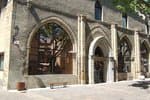Muande de Bonnabelle
From the right-hand shore of the Lac de Serre-Ponçon, set off on a path taking you through a rural landscape of grazing land and crops. The atmosphere changes as you move through a forested area at the foot of Mont Guillaume. Make the most of the cool freshness of the woods before coming to yet more vantage points over the Lac de Serre-Ponçon and its surroundings.
6 points of interest
 Fauna
FaunaThe Grey Cuckoo
This is a medium-sized migratory bird, identified by its "cuckoo" song, from April to July, between woodland and open spaces.
The females seek out the nests of small sparrows and eat one of the eggs of the occupied nest before laying their own. In the cuckooed nest, the cuckoo chick, which is born before the others, will eject all the other eggs so it can be raised by its adoptive parents! Know-how
Know-howRetaining walls
The retaining walls are made of dry stone. They are called restanques in Provence. In steep areas, they can be used to create farmed terraces by retaining the soil. At the time, their construction enabled generations of farmers to make a living from their land, which became fertile and arable. Today, many researchers and craftsmen are trying to bring back this age-old technique. Pastoralism
PastoralismGrazing
Pastoralism is an extensive farming technique practised by livestock farmers. It exploits natural resources to feed the herd. This practice is now thought to have begun around 10,000 years ago. Certain animals with a natural tendency to group together are then domesticated. The search for food led mankind to raise these herds with a nomadic lifestyle. This practice is very important in terms of maintaining open environments and encouraging certain specific species. Fauna
FaunaDeer
In the semi-darkness, their mirror, that white spot under the tail in the shape of a heart for the female and a bean for the male, can give them away. Elegant, agile and fast, the roe deer is very discreet but leaves the imprint of its frail hooves on the snow or mud up to the alpine level. They can also be spotted by their loud "voice", emitting a powerful bark when disturbed. When it starts out on life, the fawn is covered in white spots that camouflage it. This "bambi" often lies on the grass. If you find one, remember not to touch it: it hasn't been abandoned. Vernacular heritage
Vernacular heritageClapiers
"Clapier" is the term used in the southern Alps to describe a pile of stones. They are evidence of former farming activities. The stones were once removed to clear the fields. This made it easier to work the soil and saved space. Back then, everything was done by hand. Fauna
FaunaCommon Kestrel
The Common Kestrel is medium-sized. The underside of the wings has a cream colour with black spots. The male’s head and top of its tail is blue-grey. This bird of prey flies rapidly, beating its wings fairly continuously, alternating changes of trajectory, short glides and sudden dives. Its characteristic feature is that it comes to a halt in flight, tail open like a fan, wings beating very rapidly, on the lookout for prey. This is known as the "flight of the Holy Spirit".
Altimetric profile
Information desks
Tourist office Chorges
Grand rue, 05230 Chorges
October to may : Monday to Saturday, 9.00 - 12.30 & 13.30 - 17.00.
April, may, june & september : Monday to Saturday, 9.00 - 12.30 & 14.30 - 18.00
July and August : Monday to Saturday, 9:00 – 12.30 & 14.30 – 19.00 Sunday 9.30 – 12.30
Closed on Thursdays outside French holidays’ periods
Closed on French national holidays, except 14th of July and 15th of August
Tourist office Embrun
Place Général Dosse - BP 49, 05202 Embrun
October to march : Monday to Saturday, 9.00 - 12.30 & 13.30 - 17.00.
April, may, june & september : Monday to Saturday, 9.00 - 12.30 & 14.30 - 18.00
July and August : Monday to Saturday, 9.00 - 19.00. Sundays, 10.00 - 12.30 & 16.00 - 19.00
On French national holidays (except 14th of July and 15th of August) : 9am to 1pm. Closed on the 1st of January, 1st of May, 25th December and 11th November
Closed on Thursdays outside French holidays’ periods
Transport
Public transport: www.pacamobilite.fr
Consider car-sharing: www.blablacar.fr
Access and parking
Parking :
Accessibility
More information
Source

Report a problem or an error
If you have found an error on this page or if you have noticed any problems during your hike, please report them to us here:

